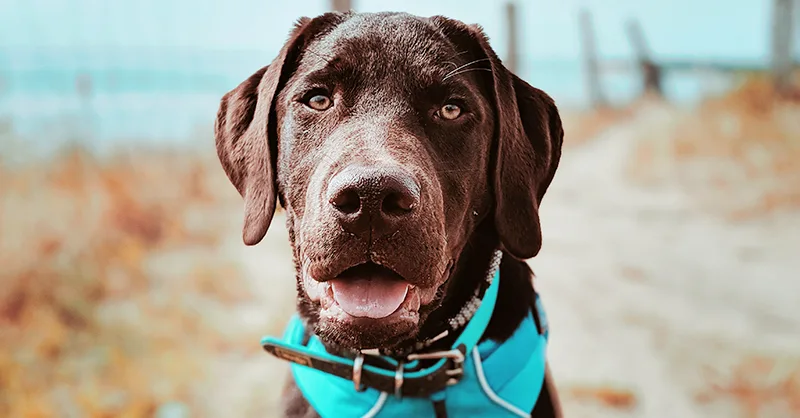Archive for the ‘Service Dog Tips’ Category
Service dogs are the superheroes of the canine world. They make the lives of people with disabilities safer and more comfortable. To achieve this, a service dog undergoes specific training, turning a pet into a medical tool helping people with disabilities complete tasks the owner could not manage themselves. The Golden State understands the vital work that service dogs perform. Therefore, California adheres to the federal laws safeguarding the use of service dogs along with more specific state laws guiding their protection.
Does your Disability Qualify for a Service Dog in California?As defined by the Americans with Disabilities Act (ADA), a person with a disability is someone:
“[…] who has a physical or mental impairment that substantially limits one or more major life activities, a person who has a history or record of such an impairment, or a person who is perceived by others as having such an impairment.”
If you are disabled and looking for a service dog, you need to first assess your needs. Not all disabilities benefit from the help of a service dog. However, many do. For example, if you have mobility issues, you can train a dog to help you obtain your cane or walker. If you struggle with diabetes, you may teach a service dog to alert you when your blood sugar is low. Consult with your healthcare provider to see how a service dog could benefit your situation.
Choose the Dog that Fits Your NeedsChoosing the right service dog breed is essential to a service dog’s success. No amount of training will allow a tiny chihuahua to prevent a large person from falling—and it would place the dog in danger. A Saint Bernard has both the size and the temperament to make an excellent service dog who could do the job safely. Also, consider your living and work environment. If you live in a crowded apartment, a smaller sized service dog might be more efficient.
Make sure your choice is based on practicality rather than preference. You may like the way a fluffy Samoyed looks. But if you or your family members have allergies, you may want to opt for a hypoallergenic dog, like an intelligent poodle.
A service dog is a long-term investment, and finding the right breed helps make that investment worthwhile.
Service Dog Certifications
Train Your Dog for Your DisabilityTraining the service dog is the most labor-intensive and time-consuming part of finding and registering a service dog. However, a well-trained service dog is the key to getting the tasks you need to complete appropriately.
The most cost-efficient way to train a service dog is to train the service dog yourself. It takes more work than other methods, but training your service dog allows you to cater the training to your specific needs. Training the dog yourself enables you and the dog to establish a connection and get to know each other, which benefits you both in the long run.
It’s safe to say that most people with a disability don’t have the time or ability to train their own service dog. In this case, you can either outsource the training or purchase a trained service dog. These options may be costly, but for people who don’t have the time or means to train their own dog, they are viable choices.
With all the resources placed into training a service dog, it may be a good idea to register your service dog.
Once you have found and trained your service dog, you may register your service dog in California. Register Your Service Dog in CaliforniaRegistering your service dog is a completely optional choice. Having documents like an ID card and being part of a comprehensive database however can offer peace of mind when you’re out with your service dog. Everyday activities become less troublesome, as questions and arguments can easily be solved by showing paperwork that labels your dog as an official service dog. Keep in mind though that registering a service dog is completely up to you and no one can demand that you register a valid service dog.
How to Register Your Dog as a Service Dog in CaliforniaRegistrations are typically done online and require just a few steps to complete:
Input the name of the handler. This usually is the person who the dog performs their service for and who they answer to. Add the name of the service dog, which would be the name the dog responds to the most often. Input and verify your email address. Upload a clear photo of your service dog. Make sure that the image is an accurate representation. Select the type of service dog certification and other items, if needed. This may be service dog accessories such as a paper certificate, collar tags, leash covers, and other tools. Why Should I Register My Dog as a Service Dog in California?Though neither the ADA nor California make registering a service dog mandatory, it can be a good idea to do so. A registered service dog can offer you a degree of privacy, shielding you from intrusive and unnecessary questions.
Also, fraudulent service dogs are on the rise. The increase in fake service dogs makes it more difficult for legitimate service dogs to do their jobs undisturbed. Providing immediate proof of a service dog’s status can build public trust in service dogs and the vital jobs they perform.
Service Dogs Protection in California Penal Code 365.7California recognized the importance of maintaining the integrity of legitimate service dogs as early as 1995. Penal Code 365.7 makes the misrepresentation of a service dog a criminal misdemeanor punishable by up to $1,000 and up to six months’ imprisonment.
California Service Dog NewsWith the help of a grant from the Uniformed Services University of Health Sciences, the California Dog Academy aims to train and offer service dogs to veterans at no cost. As of September 2019, the academy already provided 15 veterans with service dogs of their own. To qualify, veterans must meet requirements and participate in a six-week course.
Maybe you’ve noticed the proliferation of “weighted blankets” and wondered what they were and if they work. Weighted blankets are scientifically proven to be effective at reducing the symptoms of mental and emotional disorders. Some blankets weigh up to 20 pounds. The pressure placed on the body is known as deep pressure therapy (DPT). It provides comfort, security, and focus in adults and children struggling with disorders like anxiety, attention deficit hyperactivity disorder (ADHD), and autism.
Service dogs can also provide deep pressure therapy to offer the same calming benefits. International Association of Assistance Dog Partners (IAADP) recognizes how service dogs can give their owners deep pressure for a calming effect. When a person experiences symptoms of their disorder, a medium or large service dog can lay on their abdomen or chest, generating the same effect of a weighted blanket.
7 Best Dog Breeds for Deep Pressure TherapyOf course, not any dog breed will provide that same sense of comfort. A toy breed may not have the sufficient weight necessary to impact a person’s mental or emotional health.
Apart from a dog’s good temperament, it’s important to find the right-sized service dog for deep pressure therapy to get the most effective results.
Service Dog Certifications
The following are seven dog breeds that are ideal for deep pressure therapy:
1. Golden RetrieverThe Golden Retriever lands on many “best” service dog lists for a good reason. This breed is intelligent, gentle, patient, and good-natured. Children and adults with autism enjoy their happy-go-lucky personalities. They also have the right temperament and emotional intuitiveness to work with mentally or emotionally distressed individuals. Golden Retrievers are the right size and gentleness to function well during deep pressure therapy.
The Golden Retriever is a top service dog and gentle enough to give deep pressure therapy. 2. Labrador RetrieverAutism Service Dogs of America recommends Labrador Retrievers for children and adults with autism. These dogs are the right size for deep pressure therapy and have an inherent calmness to their disposition. The Labrador Retriever is also the number one most popular dog breed in the US because they are exceptional family dogs and easy to train.
3. CollieThe mild-mannered Collie is well-known for its loyalty and intelligence. Sharp and quick, Collies are eager to please and easy to train. Although they’re energetic and playful, they’re also attentive and obedient, making them great for children with autism or ADHD. Their fluffy appearance makes them look lightweight, but a male can grow as large as 75 pounds—the right size for deep pressure therapy on an older child or small adult.
Collies are well-mannered and fluffy, making for warm and soft deep pressure therapies. 4. LabradoodlePart Poodle and part Labrador (hence the name), the Labradoodle is allergy-friendly and doesn’t shed as much hair as other dogs. They are, however, still part Labrador, so people with sensitive allergies may react to Labradoodles. The Labradoodle comes from two very intelligent breeds and is highly trainable. Because they also come in many sizes, finding the right-sized Labradoodle for deep pressure therapy is easy.
5. SamoyedHugging a cushiony, furry Samoyed is like cuddling with a large teddy bear, which is why this dog is ideal for deep pressure therapy. Samoyed’s can grow up to 65 pounds, but most of that weight consists of shaggy white fur! Samoyeds are also obedient and pick up on emotions well, making them great as psychiatric service dogs for deep pressure purposes. One thing to note is that these dogs are very energetic and need frequent grooming, but it’s well worth it to have a life-sized teddy bear to hold.
The white soft fur of the Samoyed creates a teddy bear-like deep pressure therapy. 6. Great PyreneesThe Great Pyrenees are very large dogs, upwards of 100 pounds. However, they’re on this list for two significant reasons: First, they’re gentle giants. They’re excellent at keeping calm and following orders. Non-aggressive and not prone to act out, the Great Pyrenees can provide a calm sanctuary for deep pressure therapy. Secondly, this breed is intelligent and quick to pick up tasks, so training shouldn’t be a problem. Just be aware that this is a large breed and their deep pressure therapy is suitable for adolescents and adults only.
7. Bernese Mountain DogsAs the Great Pyrenees, underneath the giant Bernese Mountain Dog is a gentle soul. Weighing up to 115 pounds, these dogs are ideal deep pressure therapy dogs for adults. They’re friendly with most people, adjust well to new environments, and don’t rattle very easily. These dogs are eager to please and enjoy helping people, making them ideal for people with autism, PTSD, or ADHD.
The Bernese Mountain Dog is large and heavy but gentle at heart and eager to do DPT. Safety FirstBefore you get a service dog for deep pressure therapy, consult with your licensed healthcare provider. They can guide you in finding the right-sized service dog for deep pressure therapy. Also, there may be health contraindications that can be dangerous when using deep pressure therapy. A service dog needs to be trained to quickly remove themselves from a person if an emergency develops. Keep in mind that most dogs don’t typically enjoy being hugged or lying on a person for long periods, which is why a service dog used for DPT requires training and a calm temperament. Finding and training the right service dog for you is about the needs and safety of you and the service dog you choose.
Let everyone know your service dog is an indispensable part of your life with your Service Dog ID. Get your service dog registered below.
Florida’s tropical climate and sunny skies are a canine’s dream home. With its fun-filled beaches, green wilderness, and vast areas to run in, the Sunshine State offers pet-lovers plenty of outdoor activity options to share with their dogs. Florida ranks consistently on the top 10 pet-friendly states lists, proving how accepting Florida is of furry friends. And if you need a service dog, Florida not only has excellent service dog training options but also provides protections for service dog handlers.
What is a Service Dog?If you’re diagnosed with a disability and have a task that a service dog could perform for you, you may benefit from a service dog. First, meet with your healthcare provider to evaluate your current needs. The task a service dog performs is typically an activity the person with a disability does daily or is done for safety. Unlike therapy dogs and emotional support animals, service dogs receive extensive training to complete their required tasks.
Federal Protection for Service DogsBecause they’re an essential part of their handler’s well-being, a service dog is protected by the Americans with Disabilities Act (ADA). This federal law allows service dogs to accompany their handlers in all areas accessible to the public, even in places where pets cannot go; these include hotels, restaurants, movie theaters, and medical centers.
Service dogs are also protected under the Fair Housing Act (FHA) and Air Carrier Access Act (ACAA) laws. The FHA requires landlords and housing managers to admit service animals into their rentals without charging pet fees. The ACAA also obligates airlines to accept service dogs onto their flights, with no additional pet fees or pet restrictions. These federal laws protect service dogs and not pets. Why? Because service dogs aren’t pets!
Getting a Service Dog in FloridaIf you and your healthcare provider have decided what tasks a service dog can help you with, it’s time to determine how you want to go about finding a service dog.
Here are the four common paths to getting a service dog:
Buy a fully-trained service dog. Find a dog and train it yourself. Find a dog and outsource the more complex training. Train the dog the basic skills yourself. Buy the dog yourself, but outsource all the training to a professional.The first option is to purchase a trained service dog. Although this choice comes with the highest price tag, it saves time on training your service dog. The second and third options involve some time to train the dog yourself. Training is typically the most labor and time-intensive aspect of getting a service dog. For some owners, outsourcing all the training can be the most cost-effective and least time-consuming path to owning a service dog.
If you’re looking to train your own service dog, you’ll need to find a suitable service dog candidate. Take into consideration that the dog you choose must be capable of physically performing the required task. For example, a Chihuahua would be too small to serve as a mobility service dog to brace falls. Keep your safety — and your dog’s safety — in mind! Additionally, look for dogs that are calm, eager-to-please, and easy to train.
Scouting for Your Service Dog CandidateHere are a few places in Florida that may have the ideal service dog candidate for you:
S.A.F.E. Pet Rescue, Inc.Located in Northeast Florida, S.A.F.E. Pet Rescue, Inc. rescues dogs and cats, placing them into loving homes. Because their dogs are fostered and socialized, they’re adoption-ready and willing to be trained.
Ayla’s AcresAyla’s Acres is a no-kill pet rescue located in St. Augustine. Their 45-acre pet sanctuary (which includes farm animals) allows rescued pets the freedom and space to heal and socialize.
Training Your Service Dog in FloridaOnce you’ve obtained your service dog candidate, it’s time to start training. These training schools may be helpful:
Mind Your Manners Canine TrainingMind Your Manners Canine Training is an award-winning dog training and behavior modification school in the city of Kathleen. Their training plans cater to every dog and dog owner, changing to fit their needs. Mind Your Manners offers service dog training, along with other basic obedience skills.
Southeastern Guide DogsSoutheastern Guide Dogs offer service dogs and training at no cost, though an application and a wait time are required. Run by volunteers, Southeastern Guide Dogs also provides free psychiatric service dogs to veterans struggling with post-traumatic stress disorder (PTSD).
Service Dog Training Law in FloridaIf you need further proof that Florida is a service dog-friendly state, you’ll be happy to find that Florida state law covers service dogs beyond federal regulations. For instance, Florida Statute Chapter 413.08 covers dog trainers when training service dogs in public.
Lastly, Florida Statute Chapter 413.081 protects the health and safety of service dogs by making the intimidation or harm of a service dog open to state penalties.







